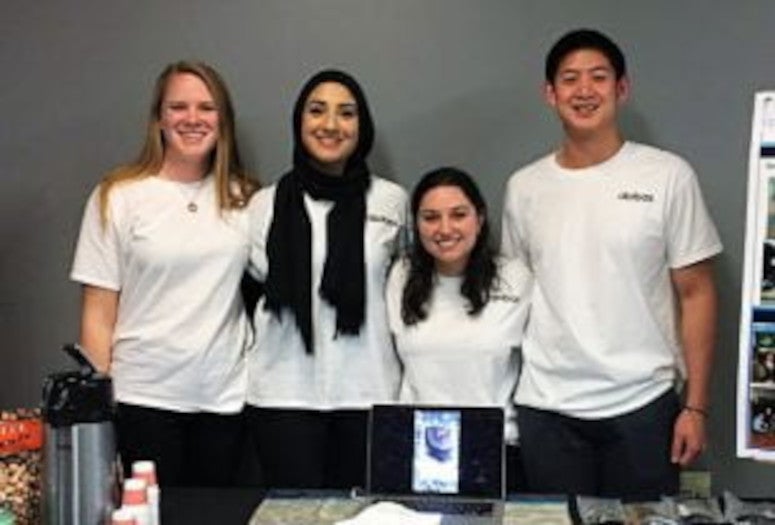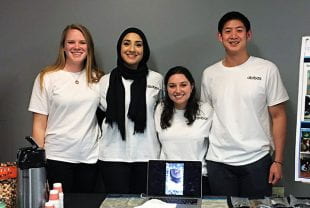Student teams from the Georgia Institute of Technology, Rice and the University of Michigan won top prizes at the 10th annual Rice 360⁰ Institute for Global Health design competition March 27, which was held online for the first time due to the pandemic.
First place went to Georgia Tech's Team Abibas for its low-cost, reusable and portable heat packs to warm newborn babies. It was the second year in a row that a Georgia Tech team took top honors at the competition.
The online contest drew 18 teams of undergraduate students from 13 universities in the U.S. and Ghana. Each team presented its design for an innovative technology to improve global health.
Team Abibas worked with medical staff in Addis Ababa, Ethiopia, to address hypothermia suffered by infants born in hospitals that lack dependable portable devices to keep newborns warm while they are moved from room to room. Team members Ashley Assa, Emelia Funnell, Fatma Rashed and Tristan Wu designed a system that creates heat with a solution of baking soda and vinegar in a sealed plastic bag. An electric trigger initiates a chemical reaction, which lasts about an hour. The heat pack and a hot water bottle can be placed in a cotton wrap to keep infants warm as they're transported through the hospital. The re-useable heat packs can be produced locally with commonly available materials.
Rice's Team At Your Cervix earned second place for a design to assist treatment of late-stage cervical cancer in low-resource settings. Team members Elisa Arango, Susannah Dittmar, Krithika Kumar, Lauren Payne and Sanika Rane presented a 3D-printed guide for the needles used to target tumors in the cervix. The guide acts as a channel through the vaginal canal to protect surrounding organs and tissues and directs the needle to the tumor target. The team worked with oncologists at the Harris County Health Center to evaluate the device in Houston.
Team Project Alivio from the University of Michigan placed third with its foot-pumped air bladder to help hospital staff lift and turn over immobile patients. With the team's system, a caregiver would place the air bladder under one side of the patient and inflate it using the foot pump. The device would raise patients 30 degrees on one side, making it easier for nurses or caregivers to turn them over. Team members Alison Choi and Anu Tuladhar tested their prototype in Guatemala and continue working with colleagues there to refine the design.
Keynote speaker Wendy Taylor, a Rockefeller Foundation Fellow and former director of the Center for Accelerating Innovation and Impact at the U.S. Agency for International Development, spoke via videoconference about her experiences developing global health technologies. She described how engineering innovation played a role in the recent responses to Ebola and Zika outbreaks.
Innovation during each outbreak led to improvements in testing, personal protective equipment for healthcare workers and in public health messaging, she said. “Bringing unlike minds together can create new ways of thinking" during a pandemic, she added. And she encouraged the students to keep their designs simple and seek feedback.
Prior the keynote, Rice 360° Director Rebecca Richards-Kortum presented Taylor with the 2020 Rice 360° Innovation and Leadership in Global Health award.
The job of quickly converting the live competition into an online event fell to Ashley Taylor, Rice 360°'s director of education, Rice 360° Co-director Maria Oden said. For the online format, participants submitted five-minute video presentations and judges selected three finalists whose videos were then shared live online to all 114 judges, competitors and spectators on March 27. Finalists shared additional details and fielded questions from judges.
The competition's 45 judges included clinicians, faculty and researchers from the Texas Medical Center, Johns Hopkins University, the University of Pennsylvania, Virginia Tech University, Clemson University, the University of Florida, the University of Colorado-Denver, Case Western Reserve University and the University of California at San Francisco as well from industries dedicated to developing and manufacturing diagnostics and biomedical devices, including Johnson & Johnson, Merck for Mothers, PATH, Fannin Innovation and UNICEF.
Competition sponsors included the Stephen W. Ley Family Endowment for Global Health and the Mehta Family Foundation.
– Carrie Noxon is a technical writer at the Rice 360⁰ Institute for Global Health.


